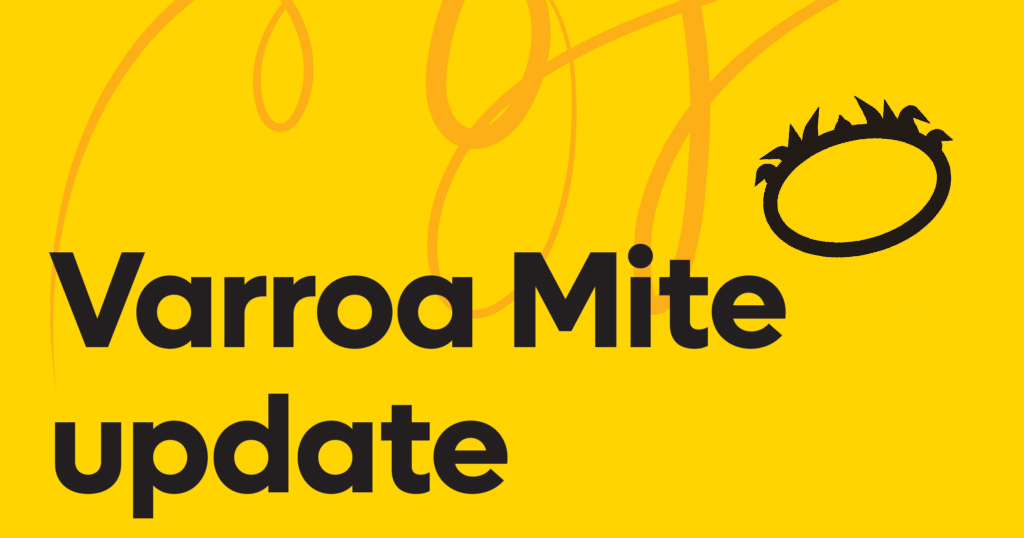AHBIC Industry Update 64 – T2M 25 November 2024
25 November 2024ApiBioxal Emergency Use Permit Approved The Australian Veterinary Pesticides and Medicines Authority (APVMA) has approved an emergency use permit for ApiBioxal, for both dribbling and fogging/vaporisation methods. This is the […]

ApiBioxal Emergency Use Permit Approved
The Australian Veterinary Pesticides and Medicines Authority (APVMA) has approved an emergency use permit for ApiBioxal, for both dribbling and fogging/vaporisation methods. This is the culmination of a significant piece of work by the NSW DPIRD continually pushed by the lobbying of AHBIC. The permit approval process has taken 10 months since the permit application was submitted with the application work initiated mid-2023.
AHBIC would like to refer beekeepers to the emergency permit on the APVMA website to read the details but wish to provide a snapshot of the detail and some clarifications for industries understanding.
- The new permit allows beekeepers, in states that have approval (currently NSW and Vic), to treat their hives with ApiBioxal.
- The permit is held by NSW DPIRD but allows for any retailer to sell the product to the public (except retailers in Tasmania) subject to local state legislation and supply.
- There is no single approved suppler list associated with this permit as was the process for other previous permits.
- We contacted the distributer in Australia and were told commencement of importation was granted only once the permit was in place. It has been confirmed that the product cannot be air freighted so must be shipped, the expected arrival of the first products will be up to 12 weeks, we estimate February 2025 at this stage.
- The permit is not a generic blanket approval for the use of any Oxalic acid chemicals, it is ApiBioxal product specific.
- There are specific personal protective equipment (PPE) requirements that beekeepers must adhere to when using the ApiBioxal products.
- ApiBioxal targets phoretic mites and has minimal effect on mites under capping’s, for greatest efficacy use when quantity of brood is non-existent or at its lowest levels.
- ApiBioxal has two application methods:
- Dribbling solution (5mL per frame full of bees, max 50mL per hive) and
- Vaporisation via electric device to a closed hive with no ventilation (2.3g per hive, 3 minute treatment followed by 15 minute closure time)
- Regardless of the method of application, ApiBioxal can only be used as a treatment twice per year.
- Beekeepers are reminded although there is no withholding period with the ApiBioxal treatment when following the permit, it is important that re-entry to treated hives within 48hours that beekeepers wear prescribed PPE and it is likely to impact the efficacy of the treatment.
Registration of “generic’ products
AHBIC is often asked about registering “generic” products that can be sourced from overseas at a much lower price point then domestically available product. AHBIC has raised this directly with the APVMA and several issues have been highlighted that makes registration challenging.
Whilst these products claim to have the same active ingredient there is no quality assurance in place or overarching regulation to ensure the efficacy and safety of these products. Studies in the USA have demonstrated that there has been variability in active ingredient concentration and inconsistencies between batches when using these types of cheaper products. This can create negative impacts on colony health, poor control of varroa and safety concerns for the beekeeper.
The APVMA have reiterated the need for the registration process to be led by the manufacturer. Contacting the manufacturers of these products to encourage them to register is challenging.
Transition from Emergency use Permits
The APVMA and NSW DPIRD have also split the grouped emergency use permits into a single minor use permits per mode of action and chemical class. As specific products achieve their full registration and Australian labelled products begin to hit the market, the separation of the permits by mode of action and chemical class will allow for easier cancellation of the minor use permits in due course. This is an administrative change and will not affect the use, except that supply business’ are no longer listed within the permit documents. This means that any supply business can now sell treatments but only to those beekeepers in states permitted to use them.
As we have repeated to several beekeepers, for clarity:
When using an emergency permit approved varroa treatment, always follow the approved permit instructions followed by the label. Any contradictions to instruction, the permit is the law. This is especially important as all current chemical treatments are running overseas labels.
Our AHBIC Chemical Treatment Table has been updated to reflect all the above changes including a summary of the ApiBioxal details.
https://honeybee.org.au/ahbic-varroa-treatment-table/
Beekeepers can click the above link for instant access to the most up to date version of the page on our website.
You can reach out to AHBIC via:
National Varroa Mite Coordinator
Bianca Giggins
0402 467 780
AHBIC, its employees, executive and consultants expressly disclaim all and any liability to any person in respect of anything, and the consequences of anything, done or omitted to be done in reliance, whether wholly, partly, upon the whole or any part of the contents of this industry update document.
